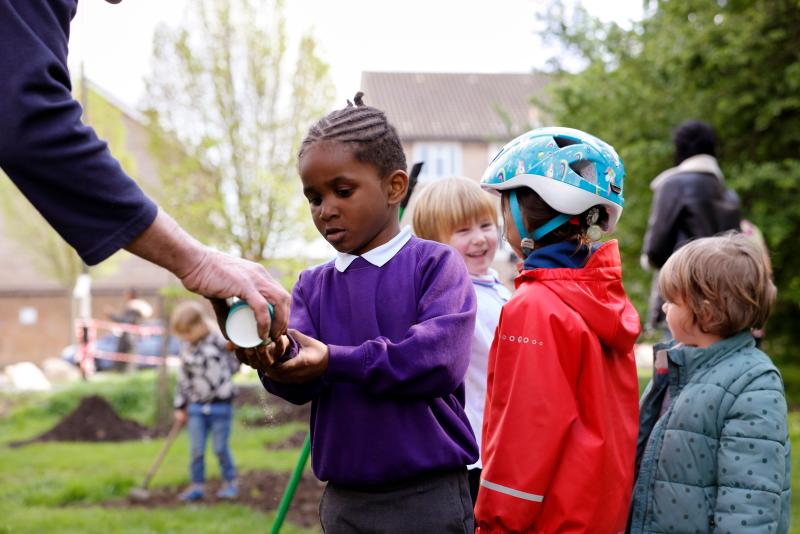Joanna Watson19 Mar 2024
Early in 2023, Friends of the Earth was delighted to announce a new multi-year partnership with The Co-operative Bank to roll out a programme of Postcode Gardeners in new locations. And with its support, help bring back nature to 1000 spaces in the most nature-deprived neighbourhoods around the country.
Ciaran Biggins joined the Experiments Team to review the programme, provide recommendations for its future direction and develop pathways to sustainability. The project has completed its pilot phase with established projects in Hackney, London and in Bideford, Devon, with several more underway – in Bristol, Birmingham, Liverpool and Notting Dale, London.
Here are some reflections on moving from experiment to national programme roll-out.
What sets the Postcode Gardener approach apart?
Each Postcode Gardener is an expert, consistently on site to maintain the gardening side, planning, planting, creating habitats – but drawing on the enthusiasm and knowledge of local people by organising and sharing gardening skills and know-how with them. Three years of experimenting have resulted in a detailed manual for new delivery partners to set up their own Postcode Gardening projects.
Crucially it’s a paid position. While there are lots of amazing community greening initiatives, they can be hard to sustain long term without a dedicated role – the Postcode Gardener can both maintain greening and support the enthusiasm of volunteers.
We’ve seen it working in practice. And most importantly we’re hoping to prove it through training on biodiversity monitoring and frameworks for outcomes, like wellbeing and nature connection, which are a fundamental part of the programme.
There are still experimental elements – even as new projects are coming on line.
Financial stability is one of the biggest experimental pieces in the programme that we still need to iterate, test and develop with partners, beyond Friends of the Earth’s and The Cooperative Bank’s involvement. Each host partner and location will have different challenges and opportunities. For example, one area might lend itself to a fee-paying service for nature friendly gardening to fund community greening. In another it could be an ecological maintenance service for a large landowner, like a housing association. One size definitely does not fit all. We have piloted the enterprise strand but don’t yet have a full model to roll out.
Friends of the Earth is interested to see whether the Postcode Gardener approach can open a pathway for people to care about the natural world more broadly, empowering them to take action to protect it. Could avoiding the use of peat in compost or plastic for horticultural use connect people to the bigger picture - loss of carbon sinks from peat bogs or adding to the mountains of plastic waste that pollute our land and waterways - and change micro-behaviours?
We still use and test hypotheses in developing the programme, for example when choosing locations. In Hull we’re looking to see whether the Postcode Gardener could help unlock the potential for a Right to Grow by showing what it could look like and demonstrating what could be possible to other councils.
We’ve hit on something communities want.
There's an appetite out there for people to come together to bring back nature – wildlife and greenery – to their neighbourhoods. It’s been so rewarding that the Postcode Gardener idea has been so well received in each of the communities we’ve engaged with. From using data to identify communities that would most benefit to meeting the people on the ground, we see the data reflected in reality. It goes beyond gardening of course – our partners in Notting Dale, impacted by flooding in 2021 and continued air pollution from the Westway, are really excited about the potential for the project to bring the community together and build resilience.
Learning and adapting as we go.
We discovered that it can be a very intensive year-long process from finding a location, partnering with community connectors to discover more about the area, identifying and recruiting a local partner to run the project and manage the Postcode Gardener. As we scale up, we’ve recognised that we need to flex and change our approach as we set up new projects, based on the insights from each wave.
For example, we’ve changed the way we find host partners. In Manchester, we launched a Greater Manchester Postcode Gardener Fund and info pack and invited organisations rooted in the community to apply. Building on expressions of interest, we shortlisted and interviewed. As a result, we now meet with multiple partners and interview in situ, including a walk around the local area.
The data guides to potential locations but the process of selecting a partner is now more competitive and we can get a sense of what they’ll be like to work with. Once recruited, they carry out the discovery work afterwards. We are hoping to bring 2 more Postcode Gardener projects in Manchester on board shortly.
It takes time to build trust.
The original pilots have run over a 3-year period from set-up to feedback. To go from that to set up 9 sites in one year is a challenge, especially as we are still experimenting with routes in to community engagement and ways the Postcode Gardener will work. What’s involved is complex and we'll always need to invest time in relationship building, listening and collaborating.
Working with The Co-operative Bank.
We are very fortunate to have co-created the proposal for the scaled-up programme with sustainability experts at The Co-operative Bank, so we could jointly present it to their Board. Having a funder that is rooted in the community is a great ethos for the programme and helps us share and build the vision together.
Our funding partnership has streamlined the approach to potential delivery partners. Previously, we were dependent on whatever could be raised through crowdfunding, along with a formal application process. Now we have a concrete funding offer over 3 years, which gives more certainty and capacity than we had in the pilot phase.
What makes a good partner.
We've learnt that the DNA of what we're looking for in a partner is:
- The reach and ability to engage under-represented and minoritised communities.
- A track record in urban greening or related nature-based activities.
- The ability to manage and navigate power dynamics within a community.
- Enterprise – ideas and a track record in generating income beyond grants.
Where might the project be in 5 years’ time?
Our dream is a Postcode Gardener cooperative that lives beyond the involvement of Friends of the Earth and The Co-operative Bank - an ecosystem of Postcode Gardeners across the country supporting each other – sharing time, money, skills and expertise as a reciprocal network. And leading local projects that are financially self-sustaining and not dependent on grants.
And tangible and visible change on the ground. Older generations noticing nature and wildlife returning in a way they remember. More kids being excited when they discover a plant or a beetle for the first time. Neighbourhoods becoming wilder. Communities better connected to nature and each other, leading to more people actively protecting our natural world. And people happier – and healthier.
If you would like to know more about the Postcode Gardener programme, please get in touch.


